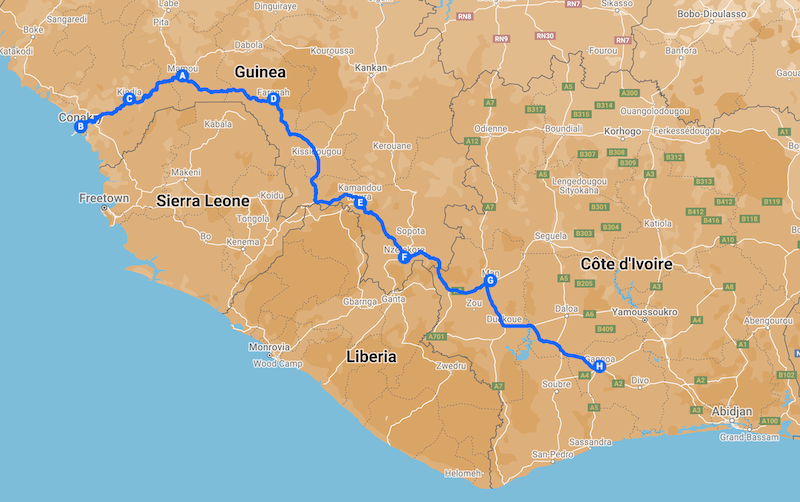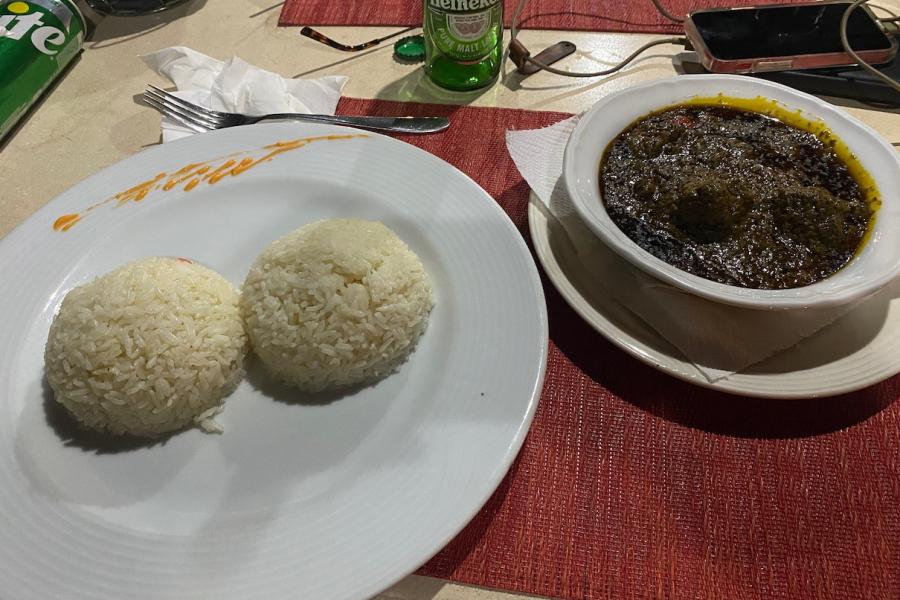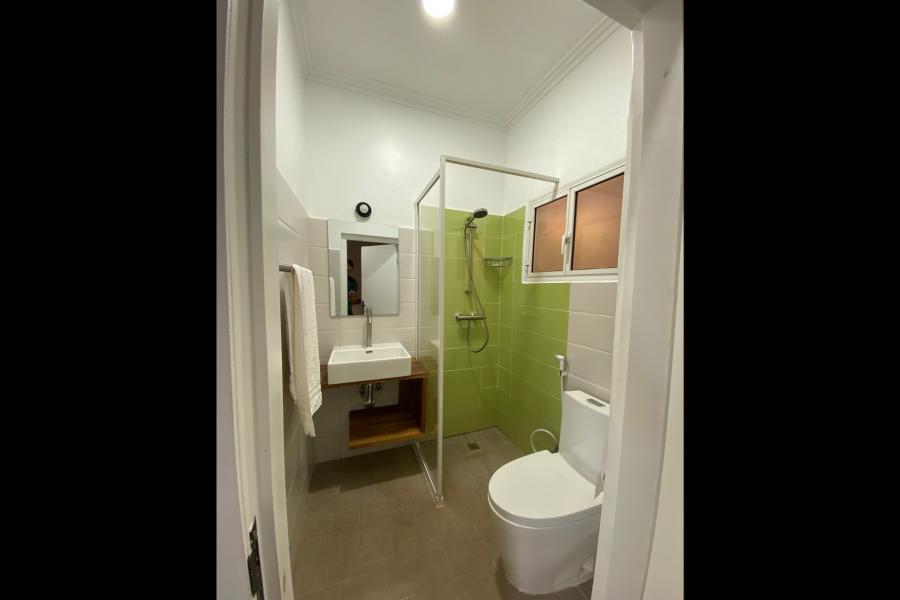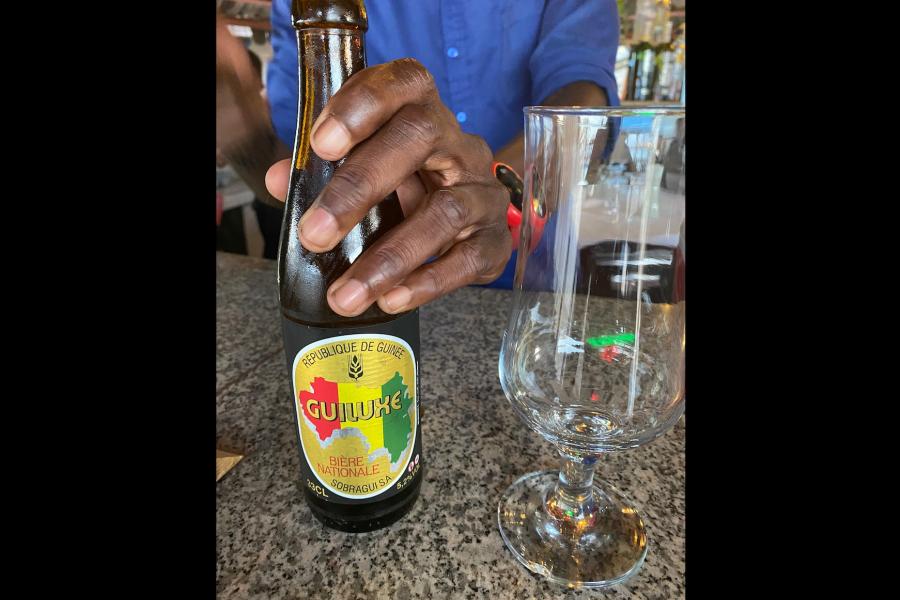Day 57: Mamou, Guinea to Gagnoa, Cote d'Ivoire
Country

3 October - Mamou to Conakry
We had a restful evening and met for breakfast over coffee, bread, and omelettes. Just enough to get us going, we packed up and got going slightly earlier than usual so we could get a head start on our day to Conakry. I was anticipating bad roads and lot of traffic when we got close to Conakry. That would turn out to be a huge understatement.
The town of Mamou is up on a plateau at a moderate elevation, so it is slightly cooler and drier there. As we rode on the newly constructed highway to Conakry, we descended in elevation and you could feel the humidity climb. The first third of the 150-mile ride was very nice on smooth paved roads. The mid section was a mess of old degraded roads riddled with potholes and frequent speed zones through small villages. The 3rd quarter of the ride was also quite nice.
It was the last 30 miles that did us in. Conakry is located on a very long and narrow peninsula which is heavily populated by the city sprawl originating at the tip. This sprawl extends 30 to 40 miles from the sea and there is only one highway in. It is a disaster of a road that is mostly paved, but congested with bumper-to-bumper traffic, stalled vehicles and no traffic laws. Very often the road would have large holes 6 to 8 inches deep and 2-3 feet wide, which would cause all traffic to grind to a halt resulting in a traffic jam 1/8 of a mile long.
I chose to follow a Google Maps alternative route to save time. It directed us to turn off the main highway and take side streets, and I learned this was s mistake. The side connector streets are 100% filled with potholes every 1-2 feet, making it impossible to travel more than 5mph. Additionally it was covered in mud, and traffic was bumper-to-bumper which added significant complication. It was like off road driving in traffic!
I lost Mark and Ranee in my rearview mirror, and later I found out that they had fallen in the middle of the traffic and landed dangerously near a moving big rig truck! They had to flag the driver to stop because Ranee’s foot was trapped under the bike. Luckily, many locals came to the rescue to help them pick the bike up. A couple minutes later they caught up with me. We took a breather, collected our thoughts, and I vowed to get us back to the main route even if it was not the fastest route. This was too dangerous for them.
We returned to the main route and it was much smoother and faster. There were many more minor interruptions as we muscled our way through 20 more miles of city traffic, filtering between the lanes with the other scooters among the dust and diesel smoke.
We arrived at the hotel around 4:30pm. We were exhausted and happy to be there. It was a nice western style hotel on an isolated peninsula. The rooms were clean and perfectly functional. Just how we like it. We re-convenened for dinner at the waterfront restaurant and de-briefed about our crazy day. I can say without reservations that Conakry has the worst roads and traffic I’ve ever experienced. It was truly terrible, and we will need to strategize about our exit route.
4 October - Conakry: Ivory Coast Embassy and Guinea Visa Errands
We awoke and met for breakfast at 7:00am. We had two errands to run: we needed to go to the Ministry of Security to get the Guinea visa sticker in our passports, and we needed to go to the Ivory Coast Embassy for our visa application. We arranged a driver from the hotel who would shuttle us around. Luckily both of our destination were less than 2 miles from the hotel.
First to the Ministry of Security. It was a heavily guarded facility with many police officers on site. We were directed to an office where an officer who spoke English who would help us get our visa sticker. He was able to explain to us that “normally” you must wait 10 days for your visa sticker after you apply. Somehow this was not explained to us previously. We explained our travel plans and that we would be exiting the country within 5 days, and they empathized with us and agreed to expedite processing overnight. We agreed to return and give them our passports later after we got our Ivory Coast visa completed.
We drove to the Ivory Coast Embassy and were greeted and ushered into a nice waiting room. We filled out the application form, provided photos, and vehicle information. The cost was $75 for the visa and $25 for the Passavant (vehicle permit). Once again they said this normally takes several days but we explained our situation and requested if we could complete the process same day. They said no, but they will ensure the papers are ready no later than 9:00am tomorrow. We were happy with the result.
As a result of these two activities both requiring our passports overnight we needed to stay an extra night here. Our hearts are not broken because the hotel is very nice!
Update: our visas for Ivory Coast were delivered to our hotel at 5:15pm same day! We were very pleased. This gave us more time to deal with the Ministry of Security.
5 October - Guinea Visa Sticker Debacle
We returned to the Ministry of Security at 8:30am. We had the contact info of the officer who was helping us and he said to call him when we arrive. My phone was not working so I was unable to call him. As a result we had to explain ourselves to get past several police officers to get to the office of our point of contact. Once there we found that they had our stickers printed and ready. They completed the process and applied our stickers on the spot and we were done.
On our way out the officer who was helping us escorted us to the exit. Instead of walking to the exit he led us to a secluded corner of the compound and proceeded to ask for money for helping us. I played confused for a few moments, then just told him no, and he conceded. We walked purposely back to the exit. It was a bit uncomfortable, but the officer knows it’s wrong, so a little resistance usually deters them.
On the way back to the hotel we ran a couple errands. Mark’s bluetooth helmet microphone quit working so we went down the street to a Moto shop to look for one. They did not have one but they sent a guy out on moped to search for what we were looking for. The guy was back in 10 minutes without success. We tipped him for his trouble and moved on. Last stop was a very nice grocery store where we stocked up on snacks and lunch material for our bikes.
The rest of the day was pretty easy. We relaxed at the hotel and had some dinner there. The food was good and they had a few African dishes which I tried. The Cassava leaf sauce with beef and rice was excellent.
6 October - Conakry to Mamou, Stopped Short at Kindia
We purposely planned to depart Conakry early to try to beat some of the traffic. While it was partly successful, it was still absolute madness to get out of the town. We started by heading out of town on the coastal road that skirts the south side of town because the freeway was one way only. Later after we reconvened with the freeway, it had cars driving into town on both sides, with outbound traffic swimming upstream in one lane at their own risk. In some places the freeway was totally blocked by police, so detours through secondary roads were necessary. Many times there was no alternative but to get on the highway. About 10 miles out we sat in gridlock at an interchange, squeezing through with the other motorbikes where we could. Things eventually loosened up, no less than 25 miles from leaving the hotel. We’ve vowed to avoid Conakry for the rest of our lives.
We hit our halfway mark for the day in the town of Kindia, so we stopped for a break at a gas station. As we chowed on our snacks and caffeine (amidst the always present audience of people) Mark and Ranee opened their luggage case on the bike to find it totally empty. They had accidentally left their entire kitchen and food bag in the hotel in Conakry! What were we to do? We sure as hell were not driving back to get it, after leaving the city with the worst roads we’ve ever been on.
Problem solving began. They evaluated the cost of the contents of the bag and how much they really need it. We determined it’s quite valuable and contains a lot of special tools they need, including the motorcycle user manual. Luckily I had the contact info of our driver at the hotel, so I sent him a message on WhatsApp. He responded immediately and said they have the bag. We decide it was best to stay where we were, and have them bring the bag to us as long as the cost was reasonable. The driver agreed to bring the bag to us which would take about 4 hours and $80.
We did a quick search for hotels in Kindia and found a great little place that was just down the street. Recently remodeled rooms with everything we need including restaurant. So we settled with a short day at the hotel and waited for the delivery of Marks bag. The guy (Mr. Bah from the Petit Bateau Hotel) showed up as expected shortly after 4pm. We were very grateful. He is a great guy to help us.
7 October - Kindia to Faranah
We set a route for Faranah because the distance was appropriate after our delay the previous day. We were familiar with part of the route because it was still on our way back to Mamou, and most of it was paved. We followed the N1 towards Faranah, and it was mostly paved with scattered potholes. It was a bit tricky but still much better than the road to Conakry, our new benchmark for the worst drive.
As we closed in on Faranah, there was a stopped truck on the side of the road. I cruised past it on the left side and noticed police officers on my right immediately after the truck. I had to slow quickly because they were all waving their hands and I almost missed it. We stopped and conversed for a moment, shared our papers, and explained our purpose. As 2 officers were talking to Mark and Ranee, one female officer was talking to me in French. She kept tapping my arm and saying “por moi? por moi?” which means “for me?”. I acted confused even though I knew what she was up to. I pointed at my empty pockets and offered her my water bottle. She refused and persisted; she was definitely asking for money. After a few more moments and a little deflection by talking about other things, she gave up and we were waved on.
We arrived at Faranah, and drove north 3 miles on a dirt road to a great hotel that was well reviewed on Google. It was a walled compound and the rooms were individual huts (with all amenities) arranged around the swimming pool. It seemed to be run by a French guy and Spanish lady. There were several Red Cross vehicles parked out front and I had a conversation with one of the guys who spoke great English; he was here working from Sierra Leone. He had a beautiful Toyota Land Cruiser that I was salivating over. He explained they do Covid vaccinations and other sickness outbreak reporting and management.
We got a couple beers and some chicken and couscous for dinner. The staff were lovely but the food was just okay. The next morning we had omelettes, bread, and coffee. All I need to get going!
8 October - Faranah to Macenta and Our Brush with the Police
The ride to Macenta was very nice. Most of the day was very nice pavement without interruption. The Chinese have been contracted to build the highways in many parts of Africa and it is evident by the construction signage with large Chinese letters. Additionally we passed many of their construction outposts used for staging of materials and administration. They’ve done a nice job and the work is still ongoing, employing local Africans. The completed roads are beautiful complete with signage.
We made a stop for gas in Kissidougu which is about halfway. On our way out of town we were making our way through the busy market lined streets, when there was a split in the road. I continued to the left, which was a mistake as I noticed the one-way signage not more than 20 feet into the street. There just so happened to be several police officers hanging out at the intersection just waiting for someone like us to make such a mistake. A small bit of chaos ensued, with the officers waving us into the shoulder of the road, asking us for our papers and chastising us for going the wrong way. I was polite about the whole thing and totally understood. One of the officers started to talk about cost in French. I heard him say 500,000 and motion to me about paying. I promptly refused as I was not going to pay for an infraction I barely committed.
A few moments later they returned our passports to us, and one of the officers who was the boss waved us to follow him. I became a bit worried because I realized he was taking us back to the police station. Indeed he was, and just a quarter mile down the road we pulled into the station and were directed to park out front. I took my time getting off my bike in protest, and begrudgingly made my way into the station. I know that we barely did anything wrong and this cop was only seeking an opportunity for us to pay.
After some polite conversation in the office, he asked for our insurance certificate which we provided. A little more redundant conversation about the violation we had made, which we already understood, and then he proposed the new fee of 1,500,000 Guinea Francs! This was significantly more than what proposed to us on the street. I rolled my eyes and shook my head at this and told him we are not paying this because we did not break any laws. After more delay, he asked me to write down what we would pay. I already knew this was a sham, but this really tips it off! I thought to myself: what’s it worth to me, and I wrote 400,000 on the paper (about $40 USD). He immediately refused but after a little back and forth he agreed and we paid.
I insisted that he write up a receipt for both of us, and he wrote each of us a receipt in his ledger book. However I don’t think he made a copy of Mark and Ranee’s ticket. This was an effort on my part to ensure he makes a record of this to prevent him from pocketing the money. Who knows what he did with it.
We gathered our papers and on our way out in front of the building he exclaimed “Emerson!” From the front porch of the station. I turned around and he saluted me from the front porch of the police station and smiled. Maybe it was a nod to us for putting up a good fight. I had no love for this guy, as I believe he got the money he wanted from us. Not a big deal. We were in good spirits because we were happy to be leaving.
The rest of the day was uneventful, coming into Macenta where we found a nice hotel. There was another couple from the USA who were Pentecostal ministers who had been here for several years. We chatted with them at dinner. When we checked out the next day, the hotel manager asked if there was anything he could improve. We gave him a couple suggestions and told him we were appreciative that he asked. He was the first to do so for our entire trip.
9 October - Macenta to Nzerekore
This was an easy day, as planned, because we needed to position ourselves for the border crossing the following day. We are always happy with a short day. We arrived at the Prince Hotel and got our rooms. In the afternoon they had no electricity. We questioned them about it and they said it will come on later, it’s only temporary. It did come on again later but then it went out again a few times. The rooms were not the cleanest, and there was an entertainment venue next door which had a wedding reception during the evening. The restaurant had only a limited selection of items on the menu which was a little frustrating, so I ordered pizza. Turns out it was some of the best pizza I had eaten the whole trip!
10 October - Nzerekore to Man Côte d’Ivoire
The day was a border crossing into Côte d’Ivoire. We had to ride about 50 miles to the border post, then another 80 miles to the city of Man. At the customs post to exit Guinea, we had to help the official to complete our Carnet de Passage. We must get the document stamped out. I don’t think he had done it before. He was very helpful and got it done. The immigration post was down the road a couple miles and was a little slower. The officer processed our documents but was reluctant to stamp us out of Guinea, because the border to Cote d’Ivoire is officially closed. We explained that we had a visa so it was OK, so he stamped us out. It seemed as though he was saying without words “good luck”.
We arrived at the Cote d’Ivoire border post and sat down in the office where we got both immigration and customs stamp. Great! We were on our way and then, of course, got stopped shortly down the road at another road block. We sat here for nearly 30 minutes while the (plain clothes) officer told us to wait until he notifies his boss. After time was up, he asked us to follow him. While we were busy getting ready and getting on our bikes he disappeared. He got in a car and went down the road. We were supposed to follow him, but I lost him. We proceeded slowly down the road for the next 5 to 10 miles and never saw him, all the while going through two more checkpoints where our papers were verified. I decided it was not a big deal and we went onward to our destination for the day.
We made it to Man and found a great hotel up on the hill overlooking the city. The geography is slightly mountainous with lush greenery.
11 October - Man to Gagnoa Côte d’Ivoire
I needed to get a new SIM card for my cell phone so I ran out to town do get one around 7:45am. I arrived at the Orange store before they opened, and there were already 10 people in front of me. I waited for nearly 45 minutes before I gave up and left. I found another shop (Moov Africa) that was open and they helped me immediately. I got it all sorted out within 20 minutes.
The ride that day was mostly nice highways with one 30-mile detour proposed by Google Maps which had us take an “old” road that was riddled with potholes and washouts. I learned my lesson that perhaps it is better to take the main highway even if the time is a little longer. We made it through, and it did indeed save us time, but it was uncomforable for Ranee.
We rode through a couple heavy thunderstorms that lasted for less than an hour. We were nearly dry by the time we arrived at the hotel (Jim's Park Hotel). It’s a nice gated facility with clean rooms and a restaurant/bar.



